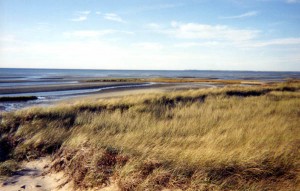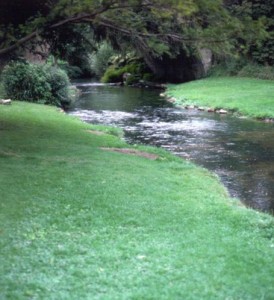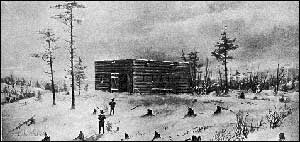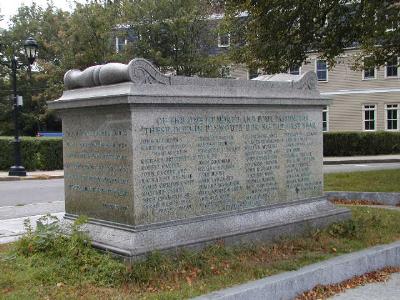The Pilgrims survived the voyage to the New World. They avoided civil disorder by establishing the Mayflower Compact. But they weren’t able to escape the specter of disease and death. How did they handle this new challenge?
 First, they had to search out a place to call home. They sent out a party of men to try to find an opportune piece of land, but the Cape Cod area wasn’t hospitable to farming, and they also had their first encounter with the natives, who attacked them. It didn’t help their cause when they decided to take some corn they found buried at one spot. Bradford recounts that since there was no one around to barter with, they took it with the idea of paying back whoever had buried it there. I believe they intended to do that (which, by the way, they did eventually), but their action was discovered and created a bad relationship with that particular tribe from the start.
First, they had to search out a place to call home. They sent out a party of men to try to find an opportune piece of land, but the Cape Cod area wasn’t hospitable to farming, and they also had their first encounter with the natives, who attacked them. It didn’t help their cause when they decided to take some corn they found buried at one spot. Bradford recounts that since there was no one around to barter with, they took it with the idea of paying back whoever had buried it there. I believe they intended to do that (which, by the way, they did eventually), but their action was discovered and created a bad relationship with that particular tribe from the start.
Coming back from one of those excursions, Bradford heard the awful news that his wife, Dorothy, had died—the first casualty of the trip. She had drowned falling over the side of the ship. We have to get this information from other sources than Bradford, since he never wrote about it. Many have speculated that she committed suicide, depressed over having to leave their young son back in Holland and now seeing the barrenness of the so-called Promised Land. Massachusetts in winter didn’t look like a promising place. Whatever the reason, her death was just the beginning.
 They finally found a harbor, although not as good a one as the Puritans later found that they christened Boston. But no one seemed to be living there and there was a nice brook running through it as a water supply. The brook is still there today, and in summer, it lends a lot to the pleasant atmosphere of the town. Yet it wasn’t summer when they arrived, and their greatest task was to build the town that would become home.
They finally found a harbor, although not as good a one as the Puritans later found that they christened Boston. But no one seemed to be living there and there was a nice brook running through it as a water supply. The brook is still there today, and in summer, it lends a lot to the pleasant atmosphere of the town. Yet it wasn’t summer when they arrived, and their greatest task was to build the town that would become home.
 The men labored from December through March to transform a wilderness into some semblance of an English village. A common house was built first to store goods; midway through the winter, it burned down and they had to start over. But that wasn’t the worst of the experience.
The men labored from December through March to transform a wilderness into some semblance of an English village. A common house was built first to store goods; midway through the winter, it burned down and they had to start over. But that wasn’t the worst of the experience.
Bradford relates, in sad words, that as the days passed, so did their band of brothers and sisters. Sickness swept the new colony. By March, half of the 102 settlers had died. At one point, only six or seven men were healthy enough to work, and they also had to take care of the sick. During this time, Edward Winslow, Bradford’s closest friend and a key leader of the colony in its early years, lost his wife as well. Frankly, if there had been natives in this area, and they had been hostile to the newcomers, the struggling colony never would have become a colony at all—it would have been wiped out.
The sailors on the Mayflower were dying also. Bradford writes about how they let each other die, afraid of catching whatever their comrades had. Yet the Pilgrims, despite their own trials, showed compassion on the dying sailors and did their best to comfort them. At least one of the seamen, who had before mocked and cursed these passengers, now credited them with being true Christians before he died. In the trial, their faith in God remained strong.
If you go to Plymouth today, you can see the large sarcophagus that commemorates this harsh first winter. But it’s more than a memorial; the remains of those who died are buried beneath it, a lasting testimony to what they endured.
In the spring, the Mayflower set sail for England. Capt. Christopher Jones told the survivors that they didn’t have to be survivors; they could go back with him and give up this venture. No one took him up on the offer. Despite the hardships, every last one of them said, in effect, “thanks for the offer, but we are staying.” Since they believed God had called them to establish this community, they were going to see it through. They remembered their initial commitment, that even if they might all perish in the attempt, they would be true to God’s calling.
I think that’s called faith.

